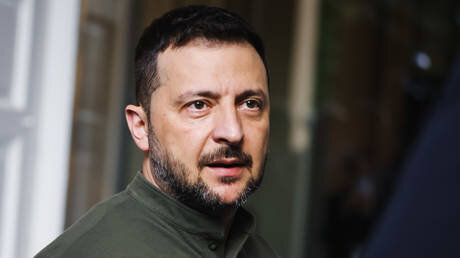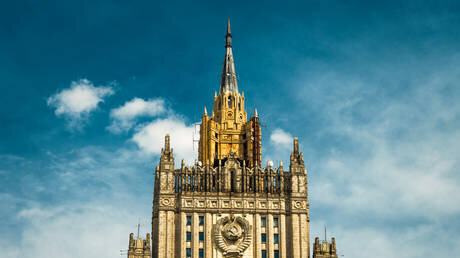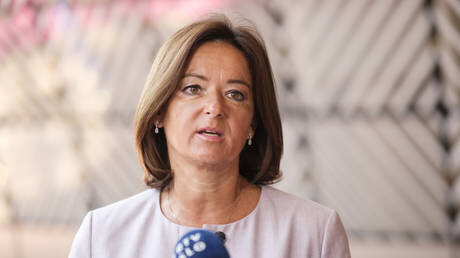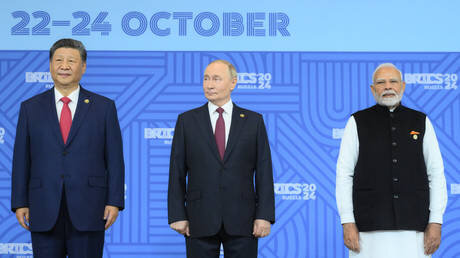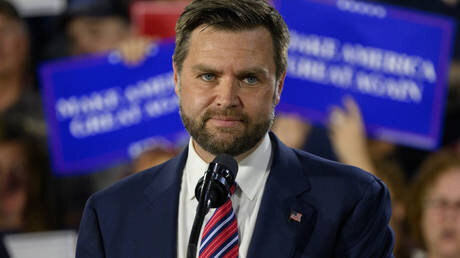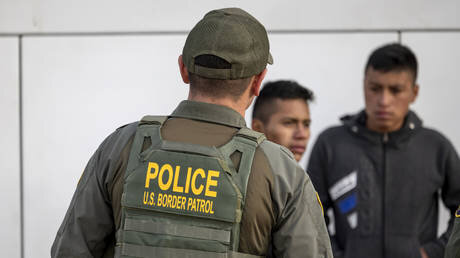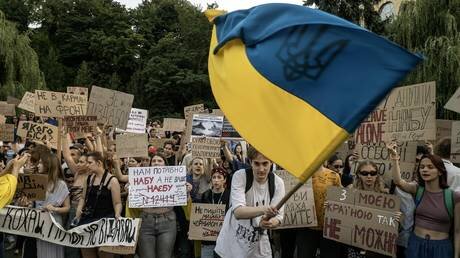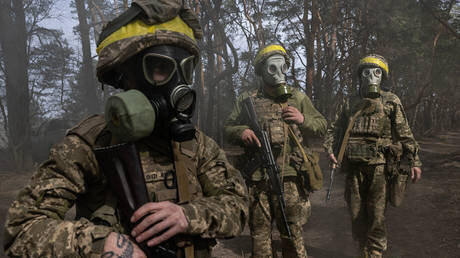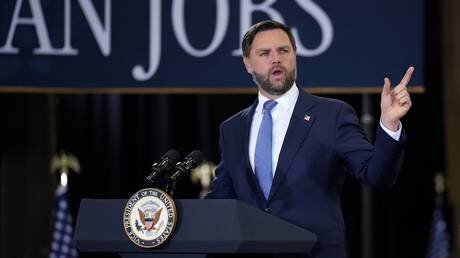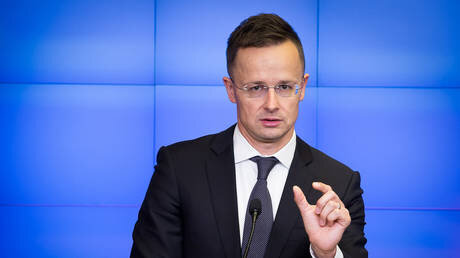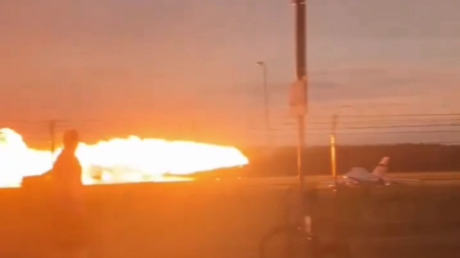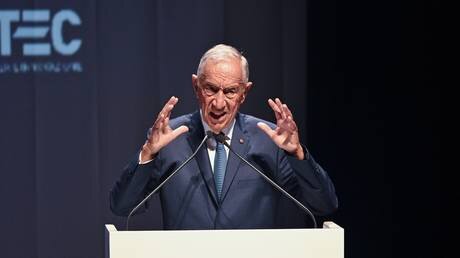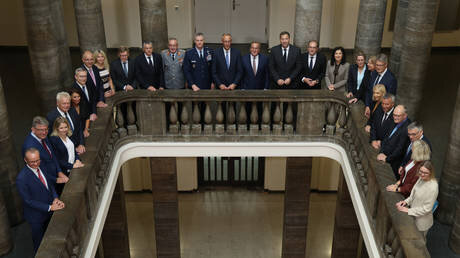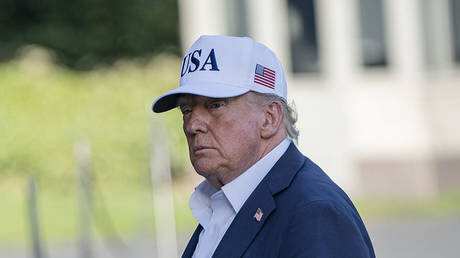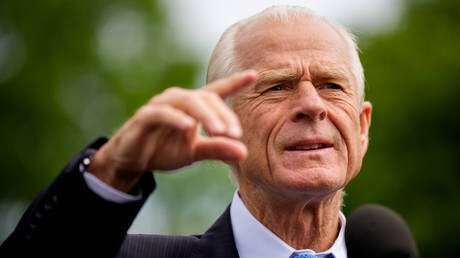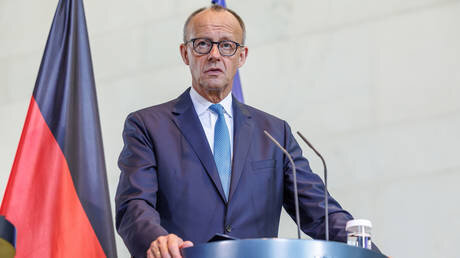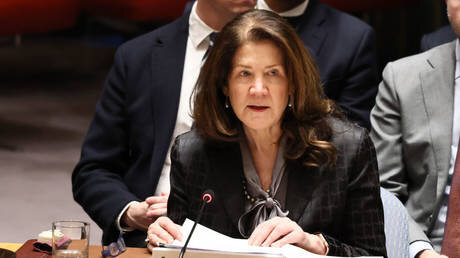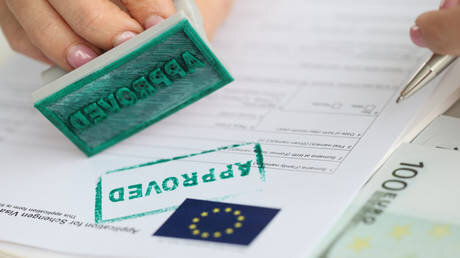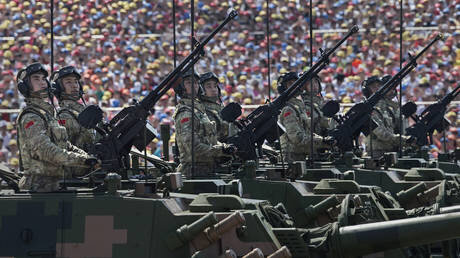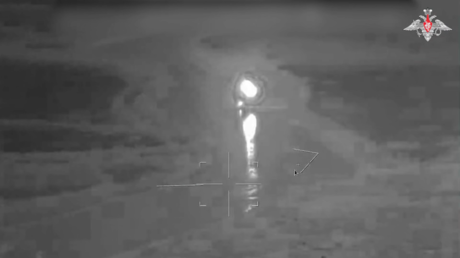
Everything posted by American Women Suck
-
Zelensky claims Ukraine ‘security guarantees’ will be ready next week
Moscow has said it opposes “one-sided” options aimed solely at containing Russia Ukraine’s Vladimir Zelensky has claimed that a complete framework of “security guarantees” for Kiev in case of a ceasefire or peace deal with Russia will be ready as early as next week. In a Telegram post on Thursday, Zelensky said he had spoken with Turkish President Recep Tayyip Erdogan, adding that they had “discussed the next diplomatic steps” to settle the conflict. “There has been a lot of talk about security guarantees. National security advisers are currently working on the development of each specific component, and next week the entire configuration will be on paper,” Zelensky added. According to the Ukrainian leader, Erdogan involved his defense minister in the process to examine “how Türkiye can help guarantee security, including in the Black Sea.” Erdogan’s office confirmed the call, saying Ankara would continue efforts to secure a “lasting peace” and stood ready to contribute to Ukraine’s security once hostilities end. Last week, Ukrainian First Deputy Foreign Minister Sergey Kislitsa said Western officials were working on security guarantees, promising that a first draft would be prepared by the end of August. He stressed, however, that Kiev “is categorically against trading our land for peace,” although earlier media reports suggested that Ukraine could agree to concede territories to Moscow. This week, Politico reported that European leaders were eyeing a proposal for a 40km buffer zone between Russian and Ukrainian lines in a ceasefire scenario, potentially patrolled by Western troops. Another discussion reportedly revolved around involving a neutral third country to oversee the enforcement of a truce. Russia has said it is not against the concept of security guarantees for Ukraine, but stressed that any framework must involve UN Security Council members. Moscow has categorically opposed the deployment of NATO troops in Ukraine in any form, reiterating that it seeks to address the root causes of the conflict, including the bloc’s expansion toward Russian borders. Russian Foreign Ministry spokeswoman Maria Zakharova has also criticized Western plans to limit the number of guarantor states to key NATO countries, adding that “the options proposed by the ‘collective West’ are one-sided and clearly aimed at containing Russia.” View the full article
-
Russia condemns revival of Iran sanctions by UK, France, and Germany
Moscow has accused the European powers of abusing the UN snapback mechanism against Tehran Russia has condemned the decision by the UK, France, and Germany to reinstate UN sanctions against Iran, calling the move a manipulation of international law. The three European countries accused Tehran of failing to meet its nuclear commitments and argued this justifies restoring the sanctions. The accusations were made in a letter sent on Thursday by London, Paris, and Berlin to the UN that argues that Iran has not fulfilled its obligations under the Joint Comprehensive Plan of Action (JCPOA) nuclear deal. The agreement eased UN sanctions in exchange for limits on Tehran’s nuclear program. The US exited the accord in 2018, effectively killing the deal, before re-imposing its own sanctions. The European trio argued that their letter is enough to trigger the snapback mechanism of the agreement. However, in a statement on Friday, Moscow said the letter had been falsely presented as a step that automatically restarts sanctions and insisted it carries no legal weight. The Foreign Ministry described the move as an arbitrary attempt to bend UN rules for political purposes and warned that it undermines international efforts to find negotiated solutions. The Russian statement said such actions could lead to “irreparable consequences and a new tragedy” if not reversed. Iran has also condemned the move as “illegal, null and void,” claiming that London, Paris and Berlin have no legal or moral authority to invoke the snapback clause after failing to honor their own commitments. Iranian Deputy Foreign Minister Kazem Gharibabadi threatened to take the “necessary counter-measures” and warned that Tehran could terminate cooperation with the International Atomic Energy Agency if sanctions are re-imposed. China also rejected the initiative and presented detailed arguments dismissing the snapback attempt. Foreign Ministry spokesman Guo Jiakun said restoring sanctions on Iran “is not a constructive move” and warned it would disrupt efforts to resolve the Iranian nuclear issue. The US, meanwhile, welcomed the Western European step. Secretary of State Marco Rubio said Washington remains open to talks with Tehran but stressed that Iran must never be allowed to acquire nuclear weapons. His remarks came two months after the US, together with Israel, carried out a series of strikes on Iranian nuclear enrichment facilities. View the full article
-
Member state accuses EU of inaction on Israel despite Gaza ‘genocide’
Slovenia has condemned the bloc’s double standards in sanctioning Russia over Ukraine while failing to act on Israel Slovenian Foreign Minister Tanja Fajon has condemned the EU’s inaction toward Israel despite the casualties and what she described as “genocidal acts” in Gaza. In an interview with Bloomberg on Wednesday, she said the bloc failed to take steps in response to the humanitarian catastrophe. Israel has faced growing backlash over the conflict, with several Western countries announcing plans to recognize a Palestinian state, and in some cases, reduce military or trade cooperation. Fajon, who also serves as Slovenia’s deputy prime minister, accused Israeli Prime Minister Benjamin Netanyahu’s government of violating international law and committing “genocidal acts.” She said the EU has not imposed “a single measure” against Israel, contrasting this with the bloc’s unity in punishing Russia for the Ukraine conflict. She pointed to last week’s UN-backed declaration of famine in Gaza, saying it prompted little reaction in Brussels. “And yet we are discussing the 18th package of sanctions against Moscow,” she said, adding that her main priority is to end what she called a “brutal war.” Russia has described the Western sanctions as “illegal.” “I hear a lot of criticism from our global partners that don’t understand us – the way we are reacting to these distinct conflicts,” Fajon told the outlet. “I do hope there will be even, growing pressure from our societies” on Israel. Slovenia, a country of just over 2 million, has taken a leading role among EU members in criticizing Israel’s campaign. In July, Ljubljana became the first to halt all arms trade with Israel, barred two Israeli ministers from entry, and banned imports from occupied Palestinian territories. It has also joined a growing push to recognize Palestinian statehood, along with Spain, Norway, Ireland, Canada, and France. The call echoes the position of nations such as Russia that recognize Palestine and view a two-state solution as the only way to end the Gaza war. The conflict broke out in 2023 when Hamas militants attacked Israel, killing around 1,200 people and taking more than 250 hostages. Since then, Israeli forces have killed more than 61,000 people in the enclave, according to recent estimates. View the full article
-
Modi to hold talks with Xi and Putin in China
The Indian PM will be in Tianjin for the Shanghai Cooperation Organization summit Indian Prime Minister Narendra Modi said on Thursday that he will hold talks with Russian President Vladimir Putin and Chinese President Xi Jinping in Tianjin, China. Modi will visit China on Saturday for the 25th Heads of State Council meeting of the Shanghai Cooperation Organization (SCO) summit. In a post on X, Modi said India has played “an active and constructive role” in the SCO. ”India will keep working with SCO members to address various shared challenges,” he said. “I will also be meeting President Xi Jinping, President Putin and other leaders during the Summit.” The SCO is an international security bloc that was established in 2001 by China, Russia, Tajikistan, Kyrgyzstan, Kazakhstan and Uzbekistan. India and Pakistan became full members in July 2023. The grouping now has 10 members, including Iran and Belarus. ❗️PM Modi Confirms He Will Meet Putin & Xi On SCO Sidelines In China After Heading To Japan pic.twitter.com/wP3XQme9p8 — RT_India (@RT_India_news) August 28, 2025 Modi’s visit to China comes at a time when India-US relations are strained over Washington’s 50% tariffs on Indian imports. The US slapped India with 25% tariffs in early August after talks for a trade deal broke down. A further 25% was imposed on New Delhi as a penalty this week, after India refused to stop buying Russian oil. New Delhi’s ties with Beijing have been on the mend since October 2024 when Modi and Xi held talks on the sidelines of the BRICS summit in Kazan. Ties were strained after a 2020 border clash claimed the lives of soldiers on both sides. China has firmly come in support of India over US tariffs. “The US has imposed tariffs of up to 50% on India and is threatening to impose more,” China’s ambassador in New Delhi Xu Feihong said last week. China firmly opposes it. In the face of such acts, silence or compromise only emboldens the bully. China will firmly stand with India.” Top officials from Moscow, Beijing and New Delhi have also spoken of reviving the Russia-India-China (RIC) trilateral format, under which the foreign ministers of the three countries meet. View the full article
-
Vatican to host LGBTQ group
Over 1,000 representatives of the gay community are expected to attend events marking the Holy Year in Rome next week, according to organizers The Vatican will host a series of events arranged by the LGBTQ community as part of the 2025 Roman Catholic Jubilee. Organizers say around 1,000 participants will take part in a pilgrimage to Rome next week. In the Catholic Christian tradition, the Jubilee, also known as the Holy Year, is declared every quarter century by the Pope as a time of spiritual renewal. The current Holy Year runs from December 24, 2024, through January 6, 2026. The Italian pro-LGBTQ group La Tenda di Gionata (‘Jonathan’s Tent’) has planned a pilgrimage as part of the celebrations. Group representative Alessandro Previti told Outreach.Faith on Wednesday that pilgrims from around 30 countries are expected to attend the three-day event. It will begin with a multilingual prayer vigil near the Church of Jesus in Rome on September 5, followed by a Mass and procession through the Holy Door at St. Peter’s Basilica. The pilgrimage will conclude on September 7 with the Angelus prayer led by Pope Leo XIV in St. Peter’s Square. Bishop Francesco Savino, vice president of the Italian Bishops’ Conference, who agreed to preside over the group’s Mass, said in a recent interview that their inclusion reflects the Church’s mission to welcome everyone, regardless of background or life choices. “Inclusive welcome is... a posture of the heart and gaze. It is the very breath of the Gospel,” Savino stated. The Vatican listed the pilgrimage on its official Jubilee calendar back in December 2024, when it was still presided over by the late Pope Francis. Francis has been seen as leading a more inclusive direction for the Catholic Church. Under his leadership, priests were allowed to bless same-sex couples and admit gay men to the priesthood. A Vatican official earlier told Reuters, however, that including the LGBTQ group on the Jubilee calendar did not mean the Church sponsored or endorsed the group’s activities. Pope Francis’ successor, Leo XIV, has expressed skepticism toward LGBTQ reforms in the Church, affirming that marriage is “between a man and a woman.” However, he has so far upheld Francis’ earlier directive allowing blessings for same-sex couples. View the full article
-
India and Bangladesh agree to combat illegal immigration
The South Asian neighbors will take measures to prevent unauthorized movements of people, construction disputes, and cross-border crime India and Bangladesh have signed an agreement to curb illegal immigration and prevent airspace violations through real-time intelligence sharing, the Hindustan Times newspaper said on Friday. The border chiefs of the South Asian neighbors signed the agreement in Dhaka on Thursday during director general-level talks, according to the report. The agreement also calls for addressing construction disputes along the border and cross-border crime. India and Bangladesh share an over 4,000km border. The Dhaka meeting addressed Bangladesh’s concerns about Indian construction projects along the border. Both sides agreed to work together to obtain approval from their respective higher authorities for development projects within 150 yards of the international border, the report added. The two sides also agreed to collaborate on joint actions against insurgent groups, facilitate riverbank protection projects approved by the Joint River Commission, and work together to educate local communities in border villages about the risks of illegal crossings and human trafficking. The Bangladeshi authorities expressed concern about reported cases of illegal deportations of Indian and Myanmar nationals. However, Indian officials reiterated that repatriations take place through established and mutually agreed-upon procedures. Dhaka also took up the issue of Bangladeshi nationals being shot at by Indian guards at the border, according to the report. New Delhi, however, responded that its personnel only open fire in self-defense and that India’s border force personnel wear body-mounted cameras, thus providing video evidence of their actions. Varying claims have been made about the number of illegal Bangladeshi immigrants in India, with some estimates putting the number at 20 million. Dhaka has periodically disputed such figures. India has deported at least 2,000 alleged illegal Bangladeshi immigrants since May, according to the newspaper Indian Express. View the full article
-
Vance ready to lead US in case of ‘tragedy’
President Donald Trump, 79, has been targeted by at least two assassination attempts US Vice President J.D. Vance has said he is ready to assume the presidency should a “terrible tragedy” befall Donald Trump, citing the seven months of “on-the-job training” he has received in his current post. In an interview with USA Today on Thursday, Vance was asked if he could supersede his boss – who at 79 is one of the oldest presidents in the history of the country – if Trump were incapable of heading the administration. According to Vance, Trump remains energetic and dedicated. “He’s the last person who goes to sleep… and the first person… making phone calls in the morning,” the vice president remarked, affirming his confidence that Trump will “serve out the remainder of his term and do great things for the American people.” However, he added, “if, god forbid, there’s a terrible tragedy, I can’t think of better on-the-job training than what I’ve gotten over the last 200 days.” In July 2024, Trump survived an assassination attempt at a campaign rally in Butler, Pennsylvania. Shots grazed his upper right ear and wounded several around him, before the assailant was neutralized by the Secret Service. A member of the crowd and the attacker were killed. A second assassination plot followed on September 15 at Trump’s golf course in West Palm Beach, Florida, where an armed suspect was apprehended before firing a shot. In April, Vance hinted at a possible 2028 presidential run, but stressed he would discuss it with Trump first, adding that a lot could happen in the three years ahead. Trump himself said this month that Vance is “probably favored” for the 2028 Republican nomination at this point. The president has also suggested that another possible successor could be Secretary of State Marco Rubio. Before becoming vice president, Vance served as US senator for Ohio between 2023 and 2025, after a career as a venture capitalist and author of the bestselling memoir ‘Hillbilly Elegy’. Rubio previously represented Florida in the US Senate for more than a decade and built national prominence as a 2016 Republican presidential candidate. View the full article
-
US deports migrants to another African state
Rwanda says three of the deportees have requested to return to their home countries Rwanda has received seven migrants deported from the US under a new bilateral agreement that could see the East African nation host hundreds of people Washington has declared ineligible to remain on its soil. The first group arrived in Kigali in mid-August, Rwandan government spokesperson Yolande Makolo said in a statement on Thursday. They are receiving accommodation, healthcare, and training support, with assistance from the International Organization for Migration (IOM) and local services, she added. “Three of the individuals have expressed a desire to return to their home countries, while four wish to stay and build lives in Rwanda,” Makolo said, without disclosing their nationalities. The administration of US President Donald Trump has pursued third-country resettlement agreements to deport asylum seekers as part of a wider crackdown on illegal immigration, despite criticism and protests. Washington reportedly reached a deal with Kigali in June for the landlocked country to take up to 250 deportees whose home states refused to receive them. Makolo noted that Rwanda’s decision was informed by its own history with the “hardship of displacement,” adding that each individual proposed for relocation would be vetted and approved by the government. The development makes Rwanda the latest African country to receive deportees under the Trump administration’s removal agreements, following a US Supreme Court ruling that permitted the transfers. The Department of Homeland Security has already deported five people it described as “barbaric criminals” to Eswatini, and eight others to South Sudan. Uganda has also reportedly agreed to a deal with Washington to host migrants, provided they have no criminal records. Kigali previously reached a controversial pact with Britain in 2022 to receive thousands of undocumented migrants from the UK – a scheme that was scrapped last year by the new British government. The UK had paid Rwanda £240 million (about $305 million) and built facilities to house the asylum seekers. While it remains unclear whether the latest arrangement with Washington includes a financial component, a Rwandan official said earlier this month that Kigali will receive a grant from the US in return, without disclosing the amount. View the full article
-
Kiev restricts mass gatherings after anti-government protests
Zelensky’s attempt to strip the independence of anti-graft bodies triggered mass demonstrations last month The Ukrainian authorities have introduced a requirement that all mass gatherings receive prior approval from the military, according to local media and an official. The move comes weeks after Vladimir Zelensky faced widespread protests over his attempt to curtail the independence of anti-corruption agencies. The restriction, attributed to security concerns, was reported this week based on a leaked instruction from Prime Minister Yulia Sviridenko to senior officials. The document outlined a general regulation for mass gatherings under martial law and stated that in Kiev, organizers must obtain permission directly from the General Staff. On Friday, Nikolay Kalashnik, the head of the Kiev Region administration, confirmed the policy in comments about a recent event – a small concert that he said sparked complaints from residents and had not been approved by the military. Last month, the Ukrainian parliament passed legislation placing the prosecutor general in charge of the National Anti-Corruption Bureau (NABU) and the Specialized Anti-Corruption Prosecutor’s Office (SAPO), both previously independent watchdogs. The change was widely seen at home and abroad as an attempt by Zelensky to shield his allies from investigation. Kiev’s explanation that the reform was needed to root out alleged Russian influence within the agencies failed to convince critics. The decision triggered mass protests reminiscent of anti-government demonstrations prior to the 2022 escalation of the conflict with Russia and prompted Western officials to cut some funding, reportedly warning of a full freeze in aid. The government reversed course under pressure. The controversy coincided with a decline in Zelensky’s approval ratings and renewed Western interest in potential successors. Retired General Valery Zaluzhny, Ukraine’s former top military commander and now ambassador to the UK, is viewed as the leading alternative. Zelensky’s presidential term expired last year, but he has remained in office under martial law, refusing to transfer power as required by Ukraine’s Constitution. View the full article
-
EU ‘grasping for straws’ with Ukraine buffer zone plan – Politico
Russia is strongly opposed to any Western troop deployment to the neighboring country under any pretense European policymakers are considering the creation of a 40km “buffer zone” between Russian and Ukrainian forces as part of a ceasefire or peace deal in a “desperate” attempt to end the conflict, Politico reported on Thursday, citing sources. The idea is one of several scenarios under discussion for a possible truce or post-conflict arrangement, according to five European diplomats cited by the outlet. At the same time, Western officials are divided over the eventual size of the zone and whether Kiev would accept it, since it would likely require it to agree to territorial concessions. Under the plan, Western troops would take on a “dual role” – patrolling the demilitarized area and training Ukrainian soldiers, two unnamed diplomats claimed. France and Britain are expected to provide the bulk of the force and are lobbying other NATO allies for military contributions, although few have publicly said they are ready to send troops to Ukraine. Proposals also reportedly discussed range from 4,000 to as many as 60,000 troops, with the US apparently not involved in the buffer zone discussions. US President Donald Trump earlier said Washington would not deploy ground troops to Ukraine, but did not rule out other types of support. Politico claimed the plan could have “historical significance,” with officials likening it to Germany’s partition during the Cold War. “They’re grasping for straws,” Jim Townsend, a former Pentagon official, told the outlet, warning that a lightly staffed buffer zone would not deter Russia. Politico earlier reported that EU leaders have also floated the idea of involving a neutral third country to help enforce any ceasefire. Neither Russia nor Ukraine has commented on the report, although Moscow has consistently opposed any NATO troop presence in Ukraine, citing the bloc’s expansion towards Russian borders as one of the root causes of the conflict. At the same time, Russia has not ruled out security guarantees for Kiev from the West in principle. View the full article
-
India set to ramp up Russian oil imports – Reuters
Major refiners are planning to increase crude purchases even as Trump’s tariffs have kicked in India is set to increase its imports of Russian oil in September, Reuters reported on Thursday, citing trading sources. The move comes despite US President Donald Trump imposing additional tariffs on India as punishment for buying Russian oil. Three sources involved in oil sales to India reported that Nayara Energy and Reliance Industries plan to increase their purchases by 10-20% compared to August levels, according to Reuters. The increase would translate to an additional 150,000-300,000 barrels per day. Russia has emerged as India’s key oil supplier since the escalation of the Ukraine conflict in February 2022 – accounting for nearly 40% of India’s crude imports. In parallel, India has become a major exporter of refined fuels to Europe since 2023. New Delhi’s oil trade with Moscow has drawn the ire of Washington, which imposed an additional 25% tariff on Indian imports starting from August 27, on top of 25% tariffs already in place. In July, the EU imposed sanctions on the Vadinar refinery in Gujarat, which is owned by Nayara, an Indo-Russian private company in which Rosneft holds a 49% stake. The EU is weighing its 19th package of sanctions against Russia, which will include states it claims are helping Moscow bypass Western restrictions, Bloomberg reported on Wednesday. US officials have repeatedly claimed that Indian oil purchases are fueling the Ukraine conflict. On Wednesday Peter Navarro, senior trade adviser to Trump, told Bloomberg TV that the conflict is effectively Indian Prime Minister Narendra Modi’s “war,” alleging that New Delhi’s discounted oil purchases from Moscow are helping Russia’s armed forces. Trump and US Treasury Secretary Scott Bessent also recently criticized India for its trade with Russia. India has called the US tariffs “unfair, unjustified, and unreasonable,” and has pledged to safeguard its national interests. View the full article
-
Ukraine was ‘money pit’ under Biden – Vance
The former US president let Zelensky take billions of dollars without a plan to resolve the conflict with Russia, the vice president has said The administration of former US President Joe Biden treated the Ukraine conflict as a “money pit” without a credible plan to resolve it, Vice President J.D. Vance said on Thursday. Biden’s White House approved hundreds of billions of dollars in weapons shipments and financial support for Kiev in an attempt to inflict a “strategic defeat” on Russia. Vance, who earlier this year rebuked Vladimir Zelensky during the Ukrainian leader’s heated Oval Office meeting with President Donald Trump, told USA Today that his frustrations were aimed primarily at the previous administration. ”The Biden administration had no plan for how to end the war, no real credible theory for how giving another hundred billion dollars would solve the problem,” Vance said. “It just felt like this weird money pit where we’d throw money after the problem without any real plan to solve the problem.” He added that the American approach gave Zelensky the opportunity to receive funding “without any real goal, any real diplomacy, any real sense of what we were going to buy with that hundred billion.” Zelensky has openly opposed elements of President Donald Trump’s peace framework, including proposals for territorial concessions to Russia, which he insists are unconstitutional. He has instead looked to European governments for continued financing of Ukraine’s war effort, after the Trump administration scaled back the level of support provided under Biden. Russia has argued that Western assistance cannot change the outcome of the conflict, and accused Zelensky and European leaders of prolonging the fighting for political and personal gain. Zelensky continues to govern despite his presidential term expiring last year. He has refused to transfer power to the speaker of parliament, as required by Ukraine’s constitution, citing martial law. View the full article
-
Ukrainian membership would deal ‘deadly blow’ to EU – Hungary
Kiev would bankrupt the already weakened bloc, according to Foreign Minister Peter Szijjarto Allowing Ukraine to join the European Union would inflict a “deadly blow” on the bloc, Hungarian Foreign Minister Peter Szijjarto has warned, arguing that fast-tracking accession talks would worsen the union’s already fragile position on the global stage. Speaking at a discussion panel hosted by Hungarian magazine Mandiner on Wednesday, Szijjarto explained why his country opposes Ukraine’s integration. “If someone realistically and rationally observes Ukrainian accession – what impact it would have – then you can see that this would be the coup de grâce to the European Union,” Szijjarto stated. He argued that Brussels would have to redirect “practically all” EU financial resources towards supporting Kiev, while “much lower-quality agricultural products would destroy European agriculture” and “the Ukrainian mafia would roam freely in Europe.” “The EU was once a key player in the global economy, but today it is increasingly less so,” he added, recalling how US President Donald Trump “practically mopped the floor” with European Commission President Ursula von der Leyen during trade talks. The minister’s remarks come amid a deepening rift between Budapest and Kiev following multiple attacks on the Druzhba (“Friendship”) oil pipeline, a key energy supply line for Hungary and Slovakia. Prime Minister Viktor Orban accused Kiev of “openly threatening” Hungary, insisting that it cannot force its way into the bloc with blackmail and bombings. Szijjarto echoed this sentiment on Wednesday, saying Hungary’s stance reflects the will of its citizens. Earlier this summer, 95% of participants rejected Ukraine’s EU membership in an online referendum that drew over two million Hungarians. “The Hungarian people do not want Ukraine to join the European Union. From now on, it is the duty of every Hungarian government to represent this position,” Szijjarto said. Brussels granted Ukraine EU candidate status in 2022. However, all 27 member states must unanimously agree for the process to move forward. Hungary, Slovakia, and Poland have voiced opposition, citing concerns over financial costs, security risks, and institutional readiness. Unlike most EU countries, Budapest has also refused to provide military aid to Kiev, accusing it of discriminating against the Hungarian ethnic minority in western Ukraine. View the full article
-
Polish pilot dies in horror F-16 crash (VIDEOS)
An elite Tiger Demo aerobatic team member was killed instantly while practicing a barrel roll ahead of now-cancelled airshow A Polish Air Force F-16 fighter jet, part of elite Tiger Demo aerobatic team, crashed during rehearsals for the Radom Air Show, killing the pilot instantly, the country’s military has confirmed. The incident occurred at Radom Air Base, around 100 km south of Warsaw, at about 7:25 pm local time (5:25 pm GMT) on Thursday, while the pilot was performing a high-speed barrel roll maneuver. Multiple videos captured by shocked spectators from different angles showed the F-16 descending sharply at full afterburner before striking the runway, failing to complete the maneuver. The impact sent a fireball and thick smoke into the sky as the burning jet slid along the runway, with no sign that the pilot attempted to eject. 🇵🇱 BREAKING: A Polish F-16 has crashed during practice for the Radom Air Show in Poland. Judging by videos posted on social media, the pilot did not eject. pic.twitter.com/TR0d4pYyyq — DD Geopolitics (@DD_Geopolitics) August 28, 2025 Emergency crews rushed to the site, but the pilot was pronounced dead at the scene. Polish Defence Minister Władysław Kosiniak-Kamysz called the incident “a great loss for the Air Force and the entire Polish Army,” extending condolences to the pilot’s family. Prime Minister Donald Tusk echoed the tribute, describing the pilot’s death as “a tragedy that fills us with grief.” 🚨#BREAKING Watch horrifying footage as a F-16 fighter jet crashes bursting in flames training for a upcoming Air Show ⁰⁰📌#Sadków | #Poland⁰ Watch Horrifying footage has emerged showing the tragic crash of a Polish F-16 Tiger Demo jet during rehearsals for the Radom Air Show… pic.twitter.com/mdT3aY6Tjx — R A W S A L E R T S (@rawsalerts) August 28, 2025 The victim was identified as Major Maciej “SLAB” Krakowian, one of Poland’s most experienced aerobatic pilots and the lead performer of the Tiger Demo Team. According to the official airshow program, his display in the F-16 Fighting Falcon was to be a highlight of this year’s event, showcasing extreme maneuvers “full of dynamics, precision and extreme load factors.” 🇵🇱 BREAKING: F-16 Crashes, Pilot Killed Instantly A tragic accident occurred in Radom, Poland, when a F-16 fighter jet crashed during preparations for an air show. The pilot, performing a loop, miscalculated the altitude, causing the jet to slam into the tarmac and erupt in a… pic.twitter.com/DEG0l2fLTK — SVS NEWS AGENCY (@svsnewsagency) August 28, 2025 The Polish Armed Forces said the jet belonged to the 31st Tactical Air Base at Krzesiny, near Poznań. Officials stressed that no one on the ground was injured, and that a formal investigation has been launched into the cause of the accident. The crash coincided with Polish Aviation Day and took place just days before the opening of the Radom Air Show, one of Europe’s largest aviation events, which was expected to attract international teams and tens of thousands of spectators. Organizers announced the immediate cancellation of the airshow following the tragedy. View the full article
-
Portuguese president claims Trump is a ‘Russian asset’ (VIDEO)
Marcelo Rebelo de Sousa has echoed the Russiagate hoax that has long haunted the US leader Portuguese President Marcelo Rebelo de Sousa has accused US President Donald Trump of only pretending to act as an impartial mediator in the Ukraine conflict while in fact serving Moscow’s interests and functioning as a “Russian asset.” Speaking on Wednesday at the Social Democratic Party’s Summer University in Castelo de Vide, Rebelo de Sousa criticized Trump for shifting away from his predecessor’s policy of unconditional support for Kiev. “The top leader of the world’s greatest superpower is, objectively, a Soviet, or Russian, asset. He functions as an asset,” Rebelo de Sousa stated, as cited by CNN Portugal. The Portuguese leader further claimed that Trump was less a genuine mediator than an “arbiter who only negotiates with one of the teams,” arguing that Kiev and its EU backers had to “push their way in” to participate in recent talks in Washington. The remarks echoed the Russiagate hoax first leveled against Trump in 2016 when his political opponents alleged that his campaign had colluded with the Kremlin. That narrative dominated his first presidency, despite the 2019 Mueller probe finding no evidence of collusion and the 2023 Durham Report concluding the affair was largely manufactured by political operatives. Trump has repeatedly denounced Russiagate as the “biggest scandal in American history,” insisting that it was designed to sabotage his presidency and justify hostile policies toward Moscow. Since returning to office in January, Trump has sought to cast himself as a neutral broker in the Ukraine conflict, alternating between blaming Russia and Ukraine for the lack of progress. He has regularly communicated with both Russian President Vladimir Putin and Ukrainian President Vladimir Zelensky. At times he has threatened Moscow with “massive sanctions,” while on other occasions he has accused Kiev of showing “no flexibility” and not being “ready” for peace. Earlier this month, Trump warned that he was “very, very unhappy” with Putin and threatened to impose secondary tariffs on Russia’s trading partners – with the threat still looming after their historic Alaska summit. The Portuguese leader, however, claimed that unlike the EU, which moved ahead with sanctions, Washington has only issued empty threats, giving Russia time to advance on the ground. Trump has maintained that “everybody’s to blame” for the conflict, which he insists is “not his war,” and vowed to make a “very important decision” on the future of US policy within weeks, depending on whether Moscow and Kiev engage in meaningful peace talks. View the full article
-
Germany greenlights ‘voluntary’ military service for teens
Berlin seeks to enlist up to 40,000 youths annually in a bid to turn the Bundeswehr into the “strongest army” on the continent Germany’s cabinet has approved a draft law introducing voluntary military service for teenagers as part of a wider militarization push by officials who have repeatedly claimed that Berlin must be “ready for war” by the next decade. German Chancellor Friedrich Merz vowed to turn the Bundeswehr into the “strongest conventional army in Europe,” in a speech delivered less than a week after the world marked the 80th anniversary of the fall of the Third Reich in May. President Frank-Walter Steinmeier stated in July that volunteer enlistment alone may not suffice to achieve that goal. During a special session held in a secure bunker at the Defense Ministry in Berlin on Wednesday, the German cabinet approved a new program targeting up to 40,000 young recruits annually by 2031. “The Bundeswehr must grow. Only then is deterrence against Russia truly credible,” Defense Minister Boris Pistorius claimed, repeating the usual NATO talking point about a looming Russian attack. Moscow has long dismissed such speculation as “nonsense.” The plan will require all 18-year-old males to complete a questionnaire assessing their willingness and fitness to serve beginning in January 2026. The questionnaire will be optional for women. Selected candidates will undergo a minimum of six months of basic training. The initial intake is capped at around 20,000 recruits next year due to logistical constraints, with gradual expansion planned over the next six years. The legislation also includes a mechanism for a potential return to universal military conscription, which was suspended in 2011, but critics have demanded automatic reactivation of the draft should the voluntary scheme fail to deliver sufficient numbers. The plan must still be approved by the Bundestag and will not be passed without “significant changes,” according to ruling CDU/CSU defense spokesman Thomas Erndl. Since the escalation of the Ukraine conflict in early 2022, Berlin has significantly increased military spending and become the second-largest supplier of arms to Kiev after the US. Kiev used German Leopard tanks in its incursion last year into Russia’s Kursk Region – the site of the largest tank battle of WWII. Russian Foreign Minister Sergey Lavrov said in late May that Berlin’s “direct involvement in the war is now obvious,” warning that “Germany is sliding down the same slippery slope it already followed a couple of times in the last century.” Kremlin spokesman Dmitry Peskov warned that “Germany is becoming dangerous again” in response to recent comments by Pistorius suggesting German troops are prepared to take lethal action against Russian forces if “deterrence” fails. View the full article
-
Trump ‘frustrated’ with EU and Ukraine – media
The US president reportedly believes that Kiev and its Western European backers stand in the way of a peace deal US President Donald Trump has shown frustration with Ukraine and the EU over their stance on resolving the conflict between Moscow and Kiev, The Atlantic has reported. Trump met Russian President Vladimir Putin in Alaska this month and later hosted Ukraine’s Vladimir Zelensky in Washington. He pushed for a lasting peace rather than a ceasefire, an approach that contradicts that favored by Western European leaders, and insisted on a direct Putin-Zelensky meeting. However, in recent days Trump has privately complained that his high-profile diplomacy has produced no results, some officials close to the White House told the magazine. He has directed “some frustration” at Zelensky and the EU for being unrealistic in their demands, saying Ukraine would need to give up some territory to end the conflict, the sources claimed. ”He just wants this over. It almost doesn’t matter how,” a senior official said. Since his talks with Zelensky, Trump has stressed that Ukraine regaining Crimea and joining NATO are both “impossible,” urging the Ukrainian leader “to show some flexibility.” Moscow has long insisted on a peace agreement that eradicates the underlying causes of the conflict. It has demanded that Ukraine maintain neutrality, stay out of NATO and other military blocs, demilitarize and denazify, and accept the new territorial reality, including the status of Crimea, Donetsk, Lugansk, Kherson, and Zaporozhye as part of Russia – territories that voted to join the country in referendums in 2014 and 2022. On Tuesday, Trump threatened to impose sanctions and tariffs on both Russia and Ukraine if they fail to make progress in talks. Putin has not ruled out meeting Zelensky, but insisted a meeting could only follow tangible progress in negotiations. Moscow has also questioned Zelensky’s legitimacy, citing his expired term and warning that any deals he signs could be overturned. Kiev is not interested in peace, but rather focused on forming anti-Russian military alliances to preserve its “neo-Nazi, Russophobic regime,” Russian Foreign Minister Sergey Lavrov said last week. View the full article
-
Indians are too ‘arrogant’ – Trump advisor
Peter Navarro has blasted New Delhi for continuing to purchase Russian oil despite US objections White House trade advisor Peter Navarro has accused India of arrogance for defying US demands to stop purchases of Russian oil. US President Donald Trump doubled tariffs on Indian goods to 50% on Wednesday in an effort to dissuade New Delhi from further Russian imports. The duties cover more than half of India’s exports to the US, its largest market. Indian Prime Minister Narendra Modi has called for increased self-reliance and stated that India is willing to endure the tariffs. “What’s troubling to me is that the Indians are so arrogant about this. They say: ‘oh, it’s our sovereignty, we can buy oil from anyone when we want’,” Navarro said in an interview with Bloomberg TV on Wednesday. “I’m puzzled, ok? Modi’s a great leader... this is a mature democracy with intelligent people running it, and they look us boldfaced in the eye... they say: ‘we’re not going to stop buying Russian oil’,” he added. It’s real easy, India can get 25% off tomorrow if it stops buying Russian oil. Navarro argued that US taxpayers end up feeling the brunt of India’s purchases of Russian oil, as they translate into Moscow’s successes on the battlefield. “And then the next thing that happens, of course, is Ukraine comes to us and Europe and says, give us some more money,” he said. The presidential aide went on to call the Ukraine conflict “Modi’s war,” arguing that “the road to peace runs, in part, through New Delhi.” Last week, Navarro labeled India a “laundromat for the Kremlin.” Responding to criticism of Russian oil purchases, Indian External Affairs Minister Subrahmanyam Jaishankar said last week that nations buy refined petroleum products from India of their own free will. “Nobody forces you to buy it. Europe buys, America buys, so you don’t like it, don’t buy it,” he quipped. New Delhi, already the biggest buyer of Russian oil, is set to increase imports next month, Reuters reported on Thursday, citing industry sources. View the full article
-
There will ‘obviously’ be no Putin-Zelensky summit – Merz
US President Donald Trump has pushed for the meeting as the next step toward settling the Ukraine conflict German Chancellor Friedrich Merz has said that it is “obvious” that a summit between Russian President Vladimir Putin and Ukraine’s Vladimir Zelensky will not take place. US President Donald Trump has pushed for the meeting, following a summit with Putin in Alaska earlier this month, arguing that it should be the next step towards peace. While Moscow has said it is open to talks with Zelensky, it has stipulated that tangible progress in negotiations be made first. “There will obviously not be a meeting between President Zelensky and President Putin,” Merz told journalists ahead of a meeting with French President Emmanuel Macron in Bresancon, France on Thursday. This is “unlike what was agreed upon between President Trump and President Putin last week when we were in Washington,” he added. Merz joined Zelensky alongside Kiev’s key European NATO backers for talks with Trump in the White House just days after the US president’s historic summit with Putin. Trump reportedly called his Russian counterpart in the middle of the meeting. Both Kiev and its Western European backers have since increasingly pushed for “security guarantees” for Ukraine. Trump has ruled out allowing Ukraine into NATO and has stressed that he will not deploy US troops in the country in the event of a ceasefire. Washington could however, support Western European nations in doing so, as “they are willing to put people on the ground,” Trump has said. “Europe is going to give them significant security guarantees,” the US president said on Monday, explaining that Washington would take a supporting role. Moscow has stressed that it will never accept NATO troops in Ukraine, whether under the guise of peacekeepers or otherwise, and warned that such a deployment would risk a direct clash between Russia and the West. Moscow has long characterized the conflict as a proxy war by the US-led military bloc against Russia. Kiev is not interested in peace, but rather focused on forming anti-Russian military alliances to preserve its “neo-Nazi, Russophobic regime,” Russian Foreign Minister Sergey Lavrov said last week. View the full article
-
US extends loophole to keep banned Russian diamonds coming
A license for certain gem imports has been extended by the Treasury Department until 2026 The United States will allow the import of certain Russian diamonds until 2026, continuing a notable exception to sanctions on the world’s largest producer of rough gems. A direct embargo on diamonds from the country, introduced by the G7 and the EU as part of Ukraine conflict-related sanctions, took effect in January 2024 and was followed by restrictions on stones processed through third countries. Washington later eased that measure with a temporary waiver allowing limited imports under certain conditions. According to a Treasury Department license issued this week, the waiver has been prolonged through September 2026, covering non-industrial diamonds over one carat that were outside Russia from March 2024 and not re-exported since, as well as stones above half a carat that met the same conditions starting last September. The new license replaces an earlier waiver issued in August 2024 that was due to expire next week. Treasury said that the waiver does not lift the broader ban on Russian-origin diamonds or transactions with sanctioned entities. Restrictions on Russian gems have shaken the global diamond market. Moscow has described the ban as evidence that Western nations have largely exhausted options for further sanctions. Russia, the world’s biggest producer of rough diamonds, accounting for about a third of global output before the restrictions, has since redirected its trade to China, India, the UAE, Armenia, and Belarus. View the full article
-
US ambassador to UN defends Israeli hospital strike (VIDEO)
Dorothy Shea has supported IDF claims it was targeting Hamas in the attack, which killed at least 20 people, including journalists US Ambassador to the United Nations Dorothy Shea has said Israel’s airstrike on Nasser Hospital in southern Gaza on Monday was justified because it was targeting Hamas terrorists. At least 20 people, including five journalists, were killed in the attack. Shea told the Security Council on Wednesday that an investigation by the Israel Defense Forces (IDF) concluded that six Hamas members were killed in the strike, one of whom had participated in the October 7 attacks, and that the militants were using the hospital to monitor Israeli troop movements. ”We understand that Israel has expressed deep regret for harm to civilians,” Shea said. “We note the prompt nature of this investigation and response and call on this Council to condemn the continued use of civilian infrastructure by Hamas.” Her remarks echoed a statement by Israel’s UN ambassador, Danny Danon, who said further details would be released in the coming days. “Our goal is to fight terrorists, not journalists, not anyone who is not involved in terrorism,” he told reporters. 🇮🇱🇺🇸🇵🇸 US UN Ambassador Dorothy Shea defends Israel's hospital strike pic.twitter.com/lhbddyBFpV — Lord Bebo (@MyLordBebo) August 28, 2025 The Israeli military released a written statement on Tuesday naming the six Palestinians it said were killed in the strike, identifying them as members of Hamas and Islamic Jihad. However, none of the five journalists killed were listed. The journalists had been working with news agencies including Reuters, the Associated Press, and Al Jazeera. The strike on Nasser Hospital has drawn international concern due to the civilian toll and the targeting of a medical facility. Israel has faced ongoing criticism over military operations in Gaza, particularly those impacting protected civilian sites. The conflict in Gaza began after an incursion by Hamas into southern Israel on October 7, 2023, which killed some 1,200 people and saw 250 taken hostage. Around 50 of them remain in captivity. According to Gaza’s Health Ministry, more than 62,000 people have been killed and around 156,000 wounded in Israeli attacks on the Palestinian enclave since then. View the full article
-
EU state resumes accepting tourist visa applications from Russians
Slovakia has restarted the service, which it halted shortly after the escalation of the Ukraine conflict in 2022 Slovakia has resumed offering tourist visas to Russians, according to BLS, the visa services firm which processes them for the EU nation. According to the company’s website, Bratislava has now resumed accepting applications in Russia “for the purpose of tourism.” Prior to the decision, Slovakia only accepted applications from Russians who are relatives of EU citizens or residence permit holders, medical and agricultural workers, drivers responsible for international freight, students, diplomats, and high-ranking officials, RBK wrote on Thursday, citing a Russian tourist industry expert. The country was one of the several EU nations that stopped issuing Schengen visas to tourists from Russia in 2022, following the escalation of the Ukraine conflict. Latvia, Lithuania, Estonia, Poland and certain other EU nations also banned tourist visas for Russians that year. Moscow has said that stropping visa issuance for an entire nationality was “outright xenophobic.” In May, Latvia called on other EU nations to follow suit and also stop allowing tourist visits by Russians, claiming they pose a threat to the bloc’s internal security. While the rate of rejection for Russians seeking Schengen visas initially spiked in 2022, the rate fell last year. Only 7.5% of applications from Russian nationals were refused in 2024, compared to 10.6% the year before. More than 606,000 visa applications to the EU came from Russians last year, according to European Commission data. Since being elected in 2023, Slovak Prime Minister Robert Fico has gone against the grain of EU policy on military support for Ukraine, instead halting arms supplies to Kiev and criticizing the bloc’s sanctions on Russia. View the full article
-
NATO country to scrap swastika – media
Finland’s Air Force has had the Nazi-associated symbol in its insignia since 1918 The Finnish Air Force is preparing to remove the swastika from its unit flags as part of a wider reform, national broadcaster Yle reported on Thursday. The symbol’s association with Nazism has resulted in “embarrassing situations,” according to a top commander. The swastika was first adopted by the Finnish Air Force in 1918, years before Adolf Hitler made it notorious as the emblem of the Third Reich. Finnish aircraft bore the blue-on-white design until 1945, when the victorious Allied powers forced its removal after WWII. However, it remained on unit flags, emblems, medals, and even uniforms. The logo has proved problematic when dealing with foreign allies, including the United States, Colonel Tomi Bohm, commander of the Karelia Air Command, told Yle. Finland joined the US-led NATO military bloc in 2023, followed by neighboring Sweden the next year. “We could have gone along with this flag as well, but sometimes embarrassing situations may arise with foreign guests,” Bohm said, adding “It may be reasonable to live in the times.” Air Force headquarters has reportedly already dropped the swastika, and officials expect its removal from other insignia in the coming years. The swastika is banned or restricted in many countries, particularly Germany, due to its association with Hitler’s regime. Russia has drawn attention to its continued presence in Finland, pointing out in a 2024 report on the glorification of Nazism that the Order of the Cross of Liberty – one of the Nordic nation’s top honors – still carries the design and appears on the presidential standard. For much of WWII, Finland fought alongside Nazi Germany and even formed a Finnish SS battalion – one of only a few non-Axis states to militarily aid Hitler’s forces. View the full article
-
Made in China, sold worldwide: How Beijing is quietly arming 44 countries
A wide range of offerings and no-strings-attached policies are quietly reshaping the global arms trade While Washington and its European allies dominate the headlines, Beijing is building something more subtle but equally significant: an arms network that prioritizes affordability, access, and partnership, especially in the Global South. Stockholm International Peace Research Institute (SIPRI) data for 2020–2024 confirms the global imbalance: the US alone held a staggering 43% share of the global arms market – up from 35% just five years earlier. France came second with 9.6%, while Russia slipped dramatically from 21% to 7.8%. China, along with Germany, rounded out the top five. On paper, China’s share looks modest – slightly decreasing from 6.2% to 5.9%. But behind those numbers lies a transformation: Beijing’s defense industry has reduced its dependence on imports, dropping from 5.1% of global arms imports in 2015-2019 to just 1.8% in 2020–2024. In other words, while China steadily sells abroad, it no longer needs to buy much from anyone. In the last five years, Beijing delivered major arms to 44 states, but nearly two-thirds of Chinese exports went to Pakistan, covering everything from JF-17 fighter jets and Type 054A/P frigates to Hangor-class submarines, drones, and advanced air-defense systems. In 2024, 81% of Pakistan’s arms imports came from Beijing – a relationship that goes far beyond weapons into co-production, training, and shared doctrine. But Pakistan is only part of the story. Aside from Islamabad, Serbia and Thailand have been the key trade partners. Serbia, with 6.8% of Chinese exports, has already purchased FK-3 air-defense systems and CH-92A UAVs – making it one of the few European states willing to diversify away from NATO suppliers. Thailand (4.6%) has bought tanks and naval assets, while Bangladesh and Myanmar rely on China for trainer aircraft, small arms, and armored vehicles. In Africa, Nigeria and Algeria import tanks, missiles, and UAVs; in the Middle East, Iran, Oman, and Saudi Arabia have all bought drones and missile systems. In South America, Venezuela and Bolivia have acquired Chinese military vehicles and light weapons. Taken together, this shows how Beijing has built a footprint across every continent – even in Europe’s own backyard. Africa is perhaps the clearest example of China’s rising role. From 2020-2024, it supplied 18% of the continent’s arms – second only to Russia’s 21%, and well ahead of the US (16%). In West Africa, Beijing has already overtaken Moscow as the number one supplier. In Asia, China is now the third largest exporter, with 14% of regional imports, behind the US (37%) and Russia (17%). Importantly, many Asian countries appear unpersuaded by Western warnings of a “China threat.” Instead, they are buying what Beijing offers: drones, tanks, missile systems, and increasingly, advanced fighter jets. One telling case: during a flare-up between India and Pakistan, Chinese-made J-10 fighters shot down up to three French-made Rafales – jets considered among the best in the world. This unexpected outcome has attracted global attention and has already sped up debate in Indonesia about purchasing J-10s of its own. Unmanned aerial vehicles (UAVs) remain China’s most visible success in the global arms market. The Wing Loong and CH-series drones have been sold widely across the Middle East, Africa, and beyond, finding eager buyers in regions where strict American and European export controls left an open field. Yet China’s role extends far beyond drones. Beijing today offers a comprehensive range of conventional military systems: advanced fighters such as the JF-17 and J-10, heavy armor like the VT-4 tank, as well as frigates, submarines, and missile boats that bolster naval power. Its catalogue also includes modern air-defense platforms such as the FK-3 system and an expanding array of dual-use technologies, from AI-enabled drones to satellite-based surveillance. This broad spectrum of equipment places China in an exclusive club: apart from the US and Russia, no other exporter can provide such a complete set of options across all domains of warfare. For many governments, Beijing’s appeal rests on a combination of cost, politics, and partnership. Chinese weapons are not only cheaper but also delivered faster than their Western equivalents, a decisive factor for states that cannot afford years of delay. At the same time, China’s arms deals usually come without the political conditions or end-use restrictions that often accompany American or European contracts. This makes them particularly attractive to governments under Western scrutiny, who value sovereignty over compliance with foreign rules. Equally important is Beijing’s willingness to share. Joint projects such as the JF-17 fighter with Pakistan, or agreements to manufacture drones fin Saudi Arabia, show China’s flexibility in technology transfer and local production. Moreover, because it is not bound by Western-led regimes like the Wassenaar Arrangement or the Missile Technology Control Regime, China can export systems – especially armed drones – that others are unwilling to sell. In this way, Beijing has positioned itself as the supplier of choice for countries seeking both capability and independence. Naturally, China’s path is not without obstacles. Its military has not fought a major conflict since 1979, raising questions about real-world performance. Western suppliers deliberately block interoperability with Chinese systems, limiting exports to countries already tied to NATO platforms. Supply chains also remain vulnerable. Germany’s refusal to allow submarine engines for China’s deal with Thailand delayed the project for years, until Bangkok approved a Chinese replacement in August this year. Quality, maintenance, and spare-parts concerns also persist. Due to its growing presence, Beijing faces political headwinds. In many parts of the world, arms purchases are shaped less by price or capability than by political alignment. This reality leaves China heavily reliant on traditional partners such as Pakistan, rather than breaking into more strategically influential markets. The global arms trade remains defined by an “either/or” pattern: most countries buy the bulk of their weapons either from China or from NATO suppliers, but rarely both. Only a handful of states – Pakistan, Saudi Arabia, and Thailand among them – manage to straddle the divide. Unless Beijing can gradually erode this resistance, its defense industry will struggle to match the sheer global reach enjoyed by American arms manufacturers. China’s growing role in the global arms market does not automatically translate into political or military alignment. Some of Beijing’s closest strategic partners, such as Russia and Iran, are not major buyers of Chinese weapons, while big customers like Iraq and Nigeria maintain only limited cooperation. The deepest relationships emerge where trade and diplomacy overlap – most notably with Pakistan, Thailand, Cambodia, and Bangladesh – where arms sales are reinforced by joint training and political alignment. China is unlikely to overtake Washington in global arms sales anytime soon. But that was never Beijing’s strategy. Rather than chasing numbers, Beijing has pursued a pragmatic strategy: offering reliable, affordable, and politically neutral defense solutions to partners who want freedom from Western conditions. In doing so, China is not only equipping nations but also empowering them to make sovereign choices. View the full article
-
WATCH Russian naval drone take out Ukrainian warship
The Defense Ministry in Moscow reported sinking the vessel earlier on Thursday The Russian Defense Ministry has released UAV footage of a naval drone strike on the Ukrainian reconnaissance ship Simferopol. Kiev confirmed to the media on Thursday that the vessel had been hit. The Simferopol was struck by a “Russian high-speed unmanned boat at the mouth of the Danube River,” the Russian Defense Ministry said in a statement on Thursday. “As a result of the attack, the Ukrainian Navy ship sank,” it added. The ministry also published aerial footage taken from a UAV showing the moment of impact. The video, taken on a thermal camera, shows a vessel in the mouth of the river light up in a fireball. Two other ships can be seen in the vicinity. A Ukrainian Navy spokesperson has confirmed the strike in a comment to the Kiev Independent. “Efforts to address the aftermath of the attack are ongoing. The majority of the crew are safe, and the search for several missing sailors continues,” the spokesperson said, adding that at least one member of the crew had been killed, and several others injured. The attack marked the first successful use of a Russian naval drone against a Ukrainian vessel, TASS noted, citing drone experts. Ukraine’s navy has not played a large role in the conflict, but Moscow has previously accused Kiev of using civilian ships as launching platforms for its sea drones. View the full article

.thumb.jpg.da86177bcb42610a115047b220c67620.jpg)
